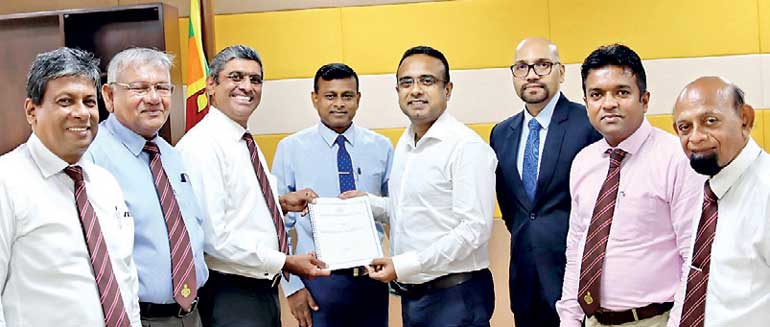Sunday Feb 22, 2026
Sunday Feb 22, 2026
Tuesday, 20 September 2022 01:14 - - {{hitsCtrl.values.hits}}

OPA President Dulitha Perera (left) hands over the proposals to Labour and Foreign Employment Minister Manusha Nanayakkara. Others from left: OPA Past President Saman Warusavithana, Dr. Lalith Wijethunga, Commissioner General of Labour Prabath Chandrakeerthi, Minister’s Personal Secretary Shan Yahampath, OPA Vice President Eng. Ravi Rupasinghe and General Secretary Eng. Upali Jayawardana
The Organisation of Professional Associations (OPA) has called for the recognition of part-timers in labour laws and regulations.
Proposals to this effect were handed over to Labour and Foreign Employment Minister Manusha Nanayakkara by OPA President Dulitha Perera
OPA said statistics revealed 160,996 jobs contracted within the first quarter of 2020 in Sri Lanka owing to the COVID-19 pandemic. The unemployment rate increased to 5.70% in March 2021 with an average of 4.50% over the past decade.
Improving the competitiveness of organisations, increasing labour market flexibility and fighting the high unemployment rates have been at the forefront of policy debates world-over for decades. Amongst the many strategies pursued to address the vacuum, one of the most ubiquitous has been to favour the use of atypical forms of employment and, “temporary” and “part-time” contracts have progressively gained popularity within many labour markets.
A “part-time employee” is an individual who works less than a specified number of hours during a standard work week as defined in the existing labour laws. Although most companies define part-time employment as anything under 40 hours, the current labour legislations in Sri Lanka do not differentiate terms of employment between part-time and full-time employment resulting in employers being hesitant to offer part-time, seasonal and temporary employment, unlike many other labour markets.
OPA President said: “We strongly recommend introducing part-time employment for Government organisations as well as promoting part-time employment in private sector organisations. There are ample success stories around the world in this era showcasing how part-time employment has benefited economies and created inclusive employment conditions for the betterment of people, organisations and the country at large.”
It was stressed that employing part-time workers would help businesses to keep costs down in areas where full-time employment is not necessary. It will allow companies to bring in highly skilled and experienced talent to help meet the short-term specific tasks or short-term projects as the business case may be.
It will enable organisations to acquire the services of expensive skills to fulfil business needs within affordable budgets. Expanding the pool of potential recruits, and part-time work trends will also attract parents with younger children and senior citizens to also contribute to the economy.
It will undoubtedly open doors to many seasonal businesses to offer job opportunities improving the ability of the businesses to respond to change and peaks of demands. The opportunity will also be appreciated by those who may not want to or are able to work full-time no more, promoting flexibility, work-life balance and many more benefits.
Offering short-term employment will predominantly help increase the number of opportunities to train and up skill school leavers, students and newly passed out graduates to meet the business demands.
The OPA Proposals were formulated by its Career Guidance and Skills Development Committee led by Vice President Eng. Ravi Rupasinghe and ably supported by Past President Dr. Lalith Wijethunga.
Overall, the OPA Proposal comprised the following recommendations for establishing recognition of part-time employment under labour laws and regulations in Sri Lanka.